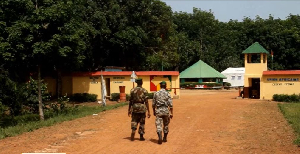Sandema (U/E), Nov. 8, GNA - Sixteen farmers in the Upper East Region were honoured on Friday for their outstanding performance in agricultural production, as the region celebrated National Farmers Day at Sandema in the Builsa District. The overall Regional Best Farmer award went to 40-year-old Suleimana Aberinga from Nyariga near Bolgatanga. A citation on his achievements indicated that Mr Aberinga had a 165-acre farm of crops including maize, millet, rice, groundnuts, tomato, pepper and water-melon. He was also into livestock rearing. For his prize, the best farmer received a corn-mill, a sewing machine, a spraying machine, assorted agro-chemicals, a radio set, a full piece of wax print and a pair of Wellington boots. Mr John Mark Atarizina from Bolgatanga was adjudged the region's best rice farmer, for which he was given a bicycle, a sewing machine, a spraying machine, assorted agro-chemicals, a piece of wax print, a pair of Wellington boots, two machetes and a shovel. Mr Timbilla Babon from Talensi-Nabdam District, and Mr Ahmed Bagobire from the Kassena-Nankana District took the best millet farmer and the best soya bean farmer awards respectively. Each took home a bicycle, a spraying machine, a set of agro-chemicals, wax print, a pair of Wellington boots, two machetes and a shovel.
Other categories that were awarded included best livestock farmer, best tomato farmer, best maize farmer, best shea-nut farmer, and best farmer in animal traction. The best fish-processor award went to Madam Margaret Mbilla from Bawku West district.
Mr Alhassan Samari, Regional Minister, cited various agricultural initiatives the region had benefited from over the years including the Upper East Land Conservation and Smallholder Rehabilitation Project (LACOSREP) and the irrigation projects at Tono and Vea. He also mentioned the ongoing rehabilitation of the Tono irrigation scheme at a cost of 7 million Ghana cedis, the cultivation of 1000 acres or 250 hectares of rice in the Gbedembilisi Valleys near Sandema through government support, and government's subsidy of the cost of chemical fertilizers in the country. Mr Samari said the interventions were meant to ensure sustainable livelihoods and improved food security for the people and gave the assurance that the Flood Recession and Dry Season Maize Production Programmes introduced by the government would continue during the 2008 dry season.
On the forthcoming general elections, the Regional Minister urged the people to go about their political activities with decorum so as to maintain the current peaceful atmosphere. He entreated them to help protect the environment by refraining from indiscriminate bush-burning. Mr Roy Ayariga, Regional Director of Food and Agriculture, observed that with the global rise in food prices, farming would become one of the most lucrative businesses in Africa. He urged farmers in the region to take advantage of that opportunity by approaching agriculture from the business point of view, rather than to continue to regard it as a way of life. "Over the years, our farmers have often produced food only for household consumption, and sold only the surplus at the local village market to meet their cash needs for funerals, festivals and school fees," he noted.
Touching on the significance of the theme for this year's Farmers Day celebration, "Globalization, Its Effects on Agricultural Production in Ghana," Mr Ayariga said farmers must begin to target markets beyond the village, town or region. This, he said, could be done by basing their production on what people in other parts of the country and the world generally needed but could not produce.
"Globalisation means that farmers in Upper East Region can access other African, European and American markets with their products," he said and that access to the international market demanded that farmers met the required quality and standards to be able to stand the competition involved.
The Regional Director cited 'gum arabic', a baobab fruit, shea-butter and mangoes as some of the agricultural potentials of the region but which the people failed to utilize for economic prosperity. Mr Thomas Alonzi, Builsa District Chief Excutive said as part of measures to encourage commercial farming in the area, the District Assembly had acquired eight tractors which were hired out to farmers at subsidized rates to be paid by instalments. He said the Assembly had also procured 10 water-pumping machines which would be given out to farmers' groups to enable them to undertake dry-season agricultural production. Twenty-one farmers from various parts of the district were also honoured for their contribution to agricultural production, with Mr, Awonkawon Atimbila from Kanjarga taking the overall District Best Farmer award. All the award winners took home assorted prizes including bicycles, sewing machines, knapsack sprayers, bags of fertilizers, fishing nets, wax prints, donkey-carts and machetes.
General News of Saturday, 8 November 2008
Source: GNA












